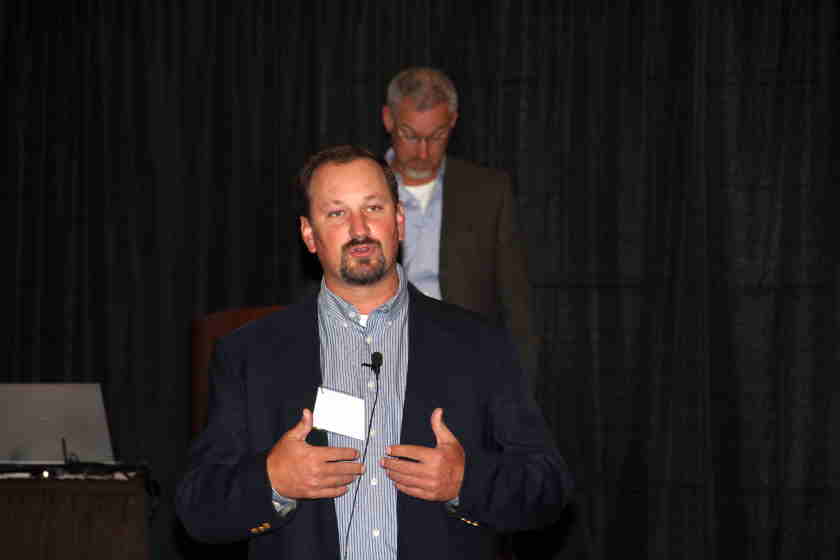
Agricultural News
No 'Silver Bullets' in Herbicide Pipeline, Says Weed Science Professor
Wed, 31 Oct 2012 16:56:58 CDT

To see the future of farming, says Jason Norsworthy of the University of Arkansas at Fayetteville, we will be looking at the past. He is a professor of weed science and spoke recently at the Oklahoma Agribusiness Retailers Association Meeting and provided his audience with a dose of reality when it comes to weed resistance. He says the problem is growing exponentially and will require radical changes in farming practices.
Norsworthy spoke with Radio Oklahoma Network Farm Director Ron Hays about what the future holds in store.
"We've been dealing with this problem for some time now throughout the mid-South. When you take a look at Oklahoma, you guys are starting to see glyphosate-resistance here within the state. It's a problem that spreads like wildfire. If you take a look at Palmer amaranth, we went from 2005 in confirming our first glyphosate-resistant Palmer amaranth here in the U.S. to now we have it in 20 states all across the U.S.
"The problem is once you lose a herbicide, you will never again be able to effectively use that herbicide on that weed. The problem is we only have a few herbicides that we can effectively use. So, as we use those and lose those, what's coming in the pipeline is going to be some time away-if there's anything coming that's going to replace these herbicides that we have resistance to today."
Round-up was brought to market in the 1970s and there have not been any newly-discovered modes of action against weeds in a very long time, Norsworthy says.
"1983 was the last time we discovered a new herbicide mode of action. Those products brought forth were Balance and Callisto and we haven't had a discovery since. We're starting to enter into what I call the phase of some new crops, that being the 2-4-D crops, the dicamba crops, but I think that's just going to be a temporary solution to try to get us over the hump."
And that hump is looking more like a mountain, he says.
"Even if we were to discover a new herbicide today, we're talking probably ten years before that herbicide ever makes it to market. So, it's going to be real frightening as to how we deal with these resistance issues and manage this problem over the next ten to 15 years."
Norsworthy says that new herbicides are only part of the solution, at best, and producers are going to have to turn to other management practices to control weeds.
"It's going to take other management practices that basically target preventing seed production and managing the soil seed bank. There are a lot of sound agronomic practices that we can use to reduce the growth and development of these weeds and, again, minimize the seed production that is occurring. Once you have a high soil seed bank, you're going to have failure of that herbicide and resistance evolve to that herbicide in a very short period of time."
Going back to old practices like chopping crops to keep the weeds from bearing seeds is one approach. Norsworthy's colleagues have said it looks like we're going back to how we controlled weeds 20 to 25 years ago and he agrees.
"We're doing a lot of chopping in the state of Arkansas, the mid-South, again trying to minimize or prevent seed production of these weeds. We've gone back and we're starting to use a good bit of tillage. I know it's probably not the best thing to do from a soil erosion standpoint, but we really don't have a lot of options in terms of trying to control these weeds."
Norsworthy says about 45 percent of Arkansas's soybeans are now field cultivated. He says he couldn't find a row cultivator in the entire state of Arkansas five or six years ago. He says it's important for producers to start clean and overlay residual herbicides before the weeds come up. Once seed has been produced, the battle has been lost. Palmer amaranth can produce an average of 500,000 seeds per plant. He says some plants in Arkansas have been confirmed producing as many as 1.8 million seeds per plant.
"The problem is if I have one resistant plant in that field and it produces half-a-million seeds, it's game over from that point on because you're going to have extremely high densities of that weed now in the soil seed bank."
Norsworthy says the future does not look bright. He does not see any "silver bullets," like glyphosate, currently in development to solve this problem.
"Unfortunately, I think, glyphosate was the silver bullet and we treated it like a silver bullet and that's what got us into the situation we're in today.
"We're going to have to go back and, like I said, farm like we were 20 or 25 years ago. It's more complex. People do not like complexity. They like simplicity. But, at the end of the day, I don't see a silver bullet in the pipeline that's coming. I'll say the 2-4-Ds, the dicambas that we're probably going to have in the next three to four years, they're not the silver bullet. They're not what glyphosate once was."
Norsworthy said the new herbicides will only be a part of an overall management program that will necessarily include increased tillage. He said farmers that built large no-till operations in the Roundup-ready era will find adaptation difficult and costly. They will have to purchase more tractors, more equipment, and hire more manpower to be able to cover the acres in a more timely fashion or risk total failure of some of the products in their management system.
Click on the LISTEN BAR below to hear Norsworthy's full conversation with Ron Hays.
Jason Norsworthy talks to Ron Hays about herbicide-resistant weeds.
WebReadyTM Powered by WireReady® NSI
Top Agricultural News
More Headlines...



















